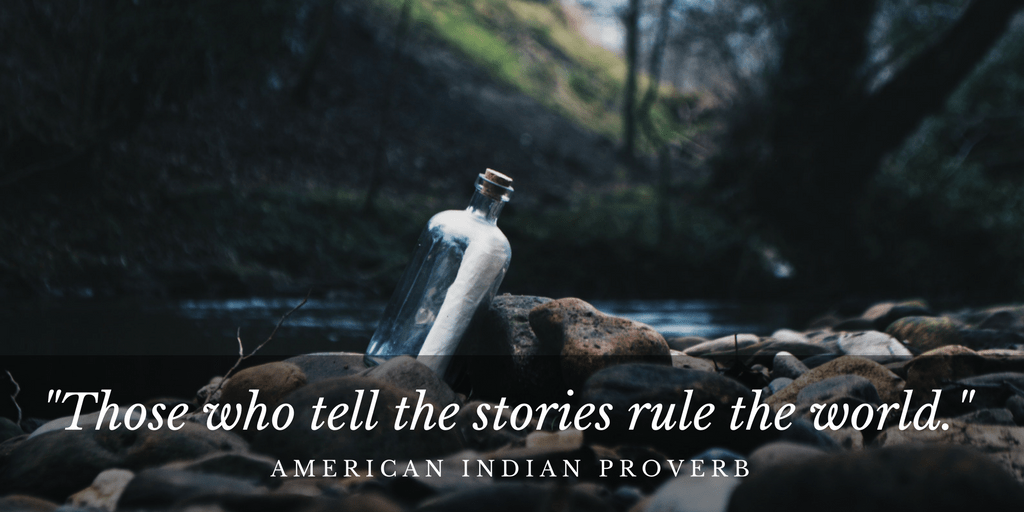A dog, to whom the butcher had thrown a bone, was hurrying home with his prize as fast as he could go. As he crossed a narrow footbridge, he happened to look down and saw himself reflected in the quiet water as if in a mirror. But the greedy dog thought he saw a real dog carrying a bone much bigger than his own.
If he had stopped to think he would have known better. But instead of thinking, he dropped his bone and sprang at the dog in the river, only to find himself swimming for dear life to reach the shore.
At last, he managed to scramble out, and as he stood sadly thinking about the good bone he had lost, he realized what a stupid dog he had been.
Lesson: “It is very foolish to be greedy.”
The Dog and His Reflection is one of the 725 famous Aesop fables. He created this story, and the others, over 2,500 years ago. What’s amazing is they weren’t written down until a few hundred years after his death.
Storytelling is so powerful that even hundreds of years can’t erase the memory.
Across our history, we’ve heard all sorts of stories from fairy tales to legendary epics. Stories pass on wisdom, they teach valuable lessons and they preserve our history.
Storytelling creates a connection to the past and to each other. It is a uniquely human skill. As far as we know, no other species creates and shares stories.
For some reason, humans don’t do well with randomness. Instead, we seek to understand and create meaning, often from things that have none. Stories help us see patterns, regardless of if they are real.
There was a study done over 75 years ago that showed this concept. Participants saw a film where two triangles and a circle moved across the screen while a rectangle stayed in one spot. Afterwards, the researchers asked the movie watchers what they saw. 99% of them created a story about the shapes. They said things like, “the circle was worried” and the big triangle was “blinded by rage and frustration.”
Only one student said that all he saw were geometric shapes on a screen – the correct answer. But this proves an important point. Humans love stories. We love them so much, we will even tell ourselves stories about random events we witness.
The reason why is still a mystery, although there are a lot of theories. One possible reason is that stories help us survive. For example, I could say “there are alligators near that pond, so don’t go down there.” I’ve shared the facts but facts alone aren’t memorable.
Instead, what if I told a story. “Zeus lives in that pond. It’s rare to see him but he’s there, waiting. We know because my uncle used to fish in that pond. One day we heard blood-curdling screams. By the time we arrived we saw Zeus pulling my uncle into the water leaving only the few fish he caught on the shore. Whatever you do, don’t go near that pond and always keep an eye out for Zeus.”
This story triggers all sorts of emotions like fear, anticipation and sadness. By tapping into the different parts of the brain that control these emotions, the story becomes memorable. Facts and statements don’t have the same effect. Research proves this point as well. When we weave information into a story, we are 22 times more likely to remember.
It may seem like storytelling is a lost art. That it’s not even that important anymore. I couldn’t disagree more. Stories are more important today than ever.
Stories can convince people to act. Stories can help other learn. Stories can persuade others to my point of view. Stories create emotion and help us all connect. Stories matter today as much as they ever have.
Just like Aesop’s Fables, great stories don’t have to be long. But, they do have to create a feeling and pull you in.
Ernest Hemingway was having lunch one day with some writers and bet $10 that he could write a six-word novel. It read “For sale, baby shoes, never worn.” Needless to say, he won the bet.
The power of storytelling is clear. I use it every day whether I am trying to teach, share or present. Stories help me connect, to pull people in and persuade.
Getting good at telling stories is another thing altogether. It takes time and effort. I continue to work at it because I can see how valuable it is to everything I do. While I may never become an expert storyteller, I plan to improve on it every day.
This post is part of a series of letters to my kids. My goal is to reflect on and capture as many life lessons as possible. Here is the current list I am working from.



